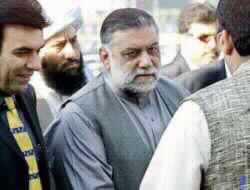- Author:
& News Agencies - Section:
WORLD HEADLINES
- Hajj & Umra WORLD HEADLINES
Pakistan Elects Pro-Military Prime Minister

Pakistan's parliament elected Mir Zafarullah Jamali of a pro-military party as its first civilian prime minister Thursday since a 1999 coup, but he will rule in the shadow of military President Pervez Musharraf. Musharraf has promised to hand over the running of the country to the prime minister, but he will remain as president for a further five years with considerable influence and the power to dismiss parliament.
Analysts and diplomats say Jamali, of the Pakistan Muslim League, has been chosen for the job precisely because he is an establishment figure who is expected to cooperate with the military.
Accepting the vote, Jamali endorsed Musharraf's legacy in the three years since the coup, stressing the general's achievements in foreign and economic policy and implicitly promising more of the same.
"On the external front, because of the policy of the last three years, Pakistan has become a frontline state, Pakistan has respect and dignity," Jamali said.
Pakistan became a key ally in the U.S.-led war on terror after the Sept. 11, 2001, attacks on the United States, and Musharraf's government has also won praise from Western donors for stabilizing the economy.
"The economy has picked up, we are about to be out of the woods," Jamali said in a confident acceptance speech. "Thanks to Musharraf who gave a road map and fulfilled his promise... the transfer of power is going on."
Jamali won a narrow majority in the ballot with 172 of the 328 votes cast, relying on the help of smaller parties and some defectors from his larger rivals. Diplomats are already wondering how long his government will last.
ISLAMISTS IN OPPOSITION
To the likely relief of investors, an alliance of hard-line Islamist groups, which rode a wave of anti-American sentiment in October's general election, was set for a spell in the opposition after declining to join the Muslim League in a coalition.
Its candidate Fazul-ur Rehman won 86 votes Thursday.
Nevertheless the Islamists, who want U.S. forces out of Pakistan, control two provincial assemblies, and are likely to be a powerful force in the Senate or upper house of parliament.
"If the army does not listen, then the gap between it and civil society will widen," Rehman warned parliament after losing the vote. "Foreign policy should be reshaped on the basis of our sovereignty. We won't accept any interference and compromise on our sovereignty."
Diplomats say the Islamists might not be able to block Pakistan's cooperation in the war on terror, but might force a more conservative agenda on social issues like women's rights.
The liberal Pakistan Peoples Party of exiled former Prime Minister Benazir Bhutto will help to make a formidable opposition bloc after its candidate Shah Mehmood Qureshi won 70 votes.
Both he and Rehman vowed to overturn a controversial set of constitutional amendments introduced by Musharraf earlier this year, which expanded the president's powers and institutionalized the role of the military through a national security council.
"The parliament is a supreme body, no other body will be accepted above the parliament," added another Islamist leader Qazi Hussein Ahmed. "It can't be described as a civilized civilian democracy in the presence of a military president."
The soft-spoken Jamali is a experienced but staid politician from the southwestern province of Baluchistan. A stout, bearded man, Jamali is a moderate Muslim who also served as a minister under military ruler Zia-ul Haq in the 1980s.
Married, with four sons and a daughter, Jamali speaks English well and is also fluent in the main local languages, including Urdu, Punjabi, Sindhi, Pashtu and Baluchi.
PHOTO CAPTION
Pakistan's National Assembly elected Mir Zafarullah Khan Jamali (c) of the pro-military Pakistan Muslim League party as the country's first civilian prime minister since a 1999 military coup. Jamali is shown meeting with party workers before entering the parliament building in Islamabad on Nov. 21, 2002. (Mian Khursheed/Reuters)
Related Articles
 Hajj virtues
Hajj virtues
-
School of Faith in Ten Days of Thul-Hijjah
The believing human self needs strong provocations in order to awaken whenever it is enveloped by laziness in...
-
The Status of Hajj in Islam
Hajj is the fifth pillar of Islam; Allah, The Exalted, ordained it in the ninth year after Hijrah (the Prophet's,...
-
School of Faith in Ten Days of Thul-Hijjah
The believing human self needs strong provocations in order to awaken whenever it is enveloped by laziness in relation...


 Home
Home Discover Islam
Discover Islam Quran Recitations
Quran Recitations Lectures
Lectures
 Fatwa
Fatwa Articles
Articles Fiqh
Fiqh E-Books
E-Books Boys & Girls
Boys & Girls  Hajj Rulings
Hajj Rulings Hajj Fatwas
Hajj Fatwas












